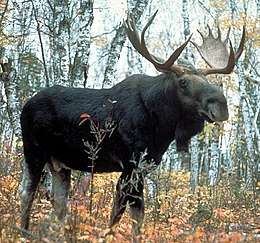大鹿
Chinese
big; great; huge; large; major; wide; deep; oldest; eldest; doctor |
deer | ||
|---|---|---|---|
| simp. and trad. (大鹿) |
大 | 鹿 | |
Pronunciation
Japanese
Etymology 1

大鹿 (ōjika): a moose.
| Kanji in this term | |
|---|---|
| 大 | 鹿 |
| おお Grade: 1 |
しか > じか Grade: S |
| kun’yomi | |
From 大 (ō, “big”) + 鹿 (shika, “deer”).[1][2] The shika changes to jika as an instance of rendaku (連濁).
Alternative forms
Usage notes
As with many terms that name organisms, this term is often spelled in katakana, especially in biological contexts, as オオジカ. Not to be confused with 牡鹿 (ojika, “stag; buck”).
Etymology 2
| Kanji in this term | |
|---|---|
| 大 | 鹿 |
| おお Grade: 1 |
しか Grade: S |
| kun’yomi | |
Compound of 大 (ō, “big”) + 鹿 (shika, “deer”). Appears to be a variation on ōjika above.
This article is issued from
Wiktionary.
The text is licensed under Creative
Commons - Attribution - Sharealike.
Additional terms may apply for the media files.